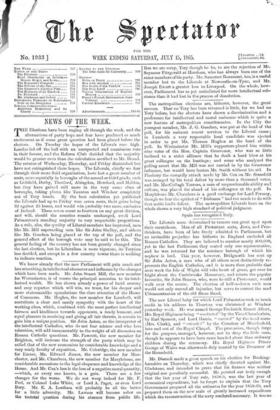We know already that the new Parliament will gain much
and lose something, in intellectual character and influence by the changes which have been made. Mr. John Stuart Mill, the new member for Westminster, is of course the principal accession to its intel- lectual wealth, He has shown already a power of lucid oratory and easy repartee which will win, we trust, for his deeper and more statesmanlike speculations the close attention of the House of Commons. Mr. Hughes, the new member for Lambeth, will contribute a clear and manly sympathy with the heart of the working class, which, combined with the most perfect intellectual fairness and kindliness towards opponents, a ready humour, and equal pleasure in receiving and giving all fair thrusts, is certain to gain him a unique position. Sir John Acton, as the interpreter of the intellectual Catholics, who do not fear science and who love toleration, will add immeasurably to the weight of all discussion on Roman Catholic questions. Mr. Fawcett, the new member for Brighton, will increase the strength of the party which may be called that of the new economists by considerable knowledge and a very ready faculty of exposition. Mr. Coleridge, the new member for Exeter, Mr. Edward James, the new member for Man- chester, and Mr. Chambers, the new member for Marylebone, are considerable accessions to the legal eloquence and knowledge of the House. And Mr. Cox's loss is the loss of a negative moral quantity, —which, as every one knows, is a gain. There are a few changes for the worse. We do not weep indeed for Mr. F. Peel, or Colonel Luke White, or. Lord A. Paget, or even Lord Bury. Mr. E. A. Leathern will probably be all the better for a little adversity. Mr. Lawson will become sober on the teetotal question during his absence from public life. But we are sorry, Tory though he be, to see the rejection of Mr. Seymour Fitzgerald at Horsham, who has always been one of the saner members of his party. Mr. Somerset Beaumont, too, is a useful member lost to the Liberals at Newcastle-on-Tyne, and Mr. Joseph Ewart a greater loss to Liverpool. On the whole, how- ever, Parliament has as yet assimilated far more intellectual sub- stance than it had lost in the process of dissolution.






























